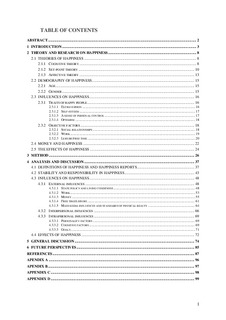| dc.description.abstract | Happiness here is investigated by means of 12 young people from Serbia and Norway. The main instrument was interview with a short questionnaire. Happiness is in line with other studies found to be a complex human quality with a variety of meanings and numerous influences. These meanings can be divided into actual happiness (predominant positive feelings and satisfaction of life), ideal happiness (complete and lasting one), good fortune or luck, the pursuit of happiness, creation of happiness and meanings of happiness within the terms of Aristotle‟s Eudaimonia (leading a virtuous life). The influences on happiness can be broadly divided into three groups. Important external influences are state policy and living conditions, work, money, free time and mass media influences and standards of physical beauty. Interpersonal influences are relationships, whereas important intrapersonal influences on happiness seem to be personality factors, cognitive factors and personal goals. Differences between two countries are emphasized regarding the satisfaction with state policy and living conditions. Cultural effects are taken into consideration when making comparisons between the two countries. Regarding the stability in happiness, we found that happiness rather goes up and down depending on what happens in one‟s life. Regarding the effects of happiness, it seems that being happy brings numerous positive effects. We concluded that happiness can be changed (despite our relative control and responsibility) and that it is a desirable goal.
When our results are confronted to the major theories of happiness, we argue that none of them (set-point theory, cognitive and affective) can by themselves explain all the variance in happiness. Critical questions were addressed to every theory of happiness. The important challenge for further research is to uncover how internal factors and events and circumstances interact (Diener, 1984). Very important is also to identify universal and cultural specific factors of happiness and to uncover how universal causes might be channelled by culture (Diener, Oishi & Lucas, 2003). One general future perspective is the methodological and theoretical sophistication. In this area there seems to be many self-help books and as the scientific studies of happiness are pretty new (they started in 1960), there is a great need for explicit scientific research. Even more so, as happiness is the bottom line of all desire, (Csikszentmihalyi, 1999) the supreme good where all the rest is means to attain it (Aristotle in Myers, 1992). | nb_NO |
